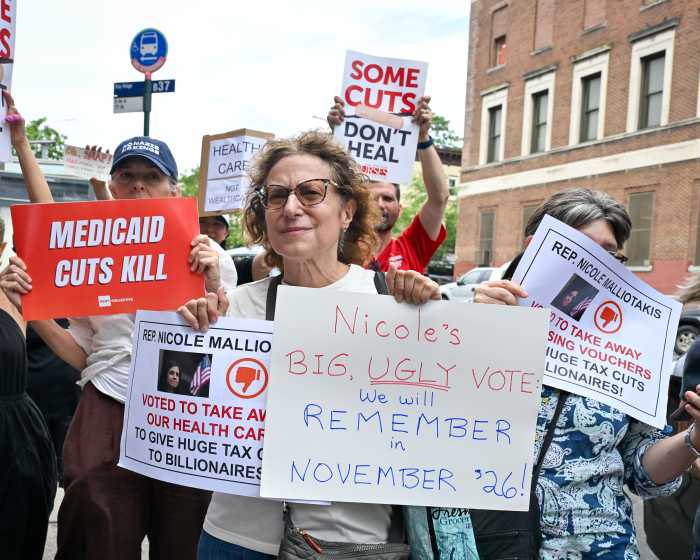A city lawmaker who battled to preserve the architectural character of Carroll Gardens could be laying the groundwork for its eventual dissolution, local residents charged this week.
Next week, Councilmember Bill de Blasio is expected to introduce a bill that would amend the city’s administrative code to allow the Hannah Senesh Community Day School to potentially expand onto its own courtyard — a defining neighborhood characteristic that critics contend should be preserved, not built up.
“This is his final farewell in the form of a middle finger,” said Triada Samaras, a member of the group Carroll Gardens Coalition for Respectful Development (CORD). De Blasio’s days as a city councilmember are fast coming to a close, as he will be sworn in as the city’s new public advocate in January. “He has just thumbed his nose at the community he used to get elected,” Samaras said. “We don’t care who’s asking to expand [into a courtyard], it’s just the wrong direction and it sets a very dangerous precedent.”
In a statement, de Blasio insisted that the proposal to explore expanding a school will have no impact on homeowners’ courtyards. The school uses the space as a parking lot, and expansion onto this “paved parking lot” does not undermine the “significant gains” made over the past several years “in protecting our neighborhood.”
“I have worked hard to preserve the unique character of Carroll Gardens, including through the historic downzoning that was just passed by the City Council,” the lawmaker continued. “I recognize the courtyards’ importance to the community as well as the need to expand the Carroll Gardens Historic District.”
Rita Miller, a member of CORD, said the lawmaker’s description of the space as a parking lot simply sweeps residents’ concerns aside. “Semantics is a funny thing,” she said. “The parking lot, as they call it, is actually a courtyard. And the fact that the law can be altered so easily and quickly to accommodate the addition onto this courtyard is shocking.”
Glenn Kelly, a member of the executive committee of the Carroll Gardens Neighborhood Association (CGNA),said he was taken aback after learning about the proposed amendment.“I’m just surprised that Bill, after championing the rezoning, would turn around and really chop away at what is really the neighborhood’s signature characteristic, our front gardens.”
Kelly said the chief concern is to protect the signature garden blocks of Carroll Gardens, devised back in 1850 as the city’s first planned community. “Way back then, it was stipulated that the gardens would be forever free of encumbrances,” he noted.
Nicole Nash, head of school for Hannah Senesh, said there were “no definitive” plans to expand. “But as head of school it’s my role to be thinking of the future,” she said.The 152-student Jewish community day school is fairly new to the neighborhood, opening its doors at 342 Smith Street only a year and a half ago. “All we are doing right now is exploring the first steps in a long process of possibly acquiring the parking lot,” Nash said.
But those who attended a recently convened meeting at the school heard a far more concrete plan. The school’s lawyer, the former City Councilmember Kenneth Fisher, made a presentation about the plan, saying it would extend the existing first and second floors of the building to the lot line at the fence along First Place and Smith Streets, according to Maria Pagano, president of the CGNA. Fisher “explained that the school has made all the necessary applications to move forward with their plan, which will add approximately eight classrooms to the existing building,” Pagano said in an e-mail. The plan, she observed, seemed to be a bit more advanced than indicated. “It sounded like they did their homework.”
The bill, those at the meeting said, would authorize the city to sell the courtyard to Hannah Senesh for a nominal fee, $1.00.
Amy Glosser, vice president of the school’s board of directors, said de Blasio has been “a real friend of the school,” which in turn has opened its doors to the entire community, lending its gymnasium to groups like the CGNA for its monthly meetings. “As we grow, our relationship with the community grows,” she said.
Glosser said members of the board have met with the lawmaker “on several occasions” to discuss the possible expansion. “We feel like this is something that can benefit the community,” she said. “We know this will be a long process.”






















